- Home
- Libba Bray
Before the Devil Breaks You Page 5
Before the Devil Breaks You Read online
Page 5
“There was trouble at a rally in October. One of us was deported, the other arrested,” Luis explained.
“We were lucky they didn’t catch all of us,” Gloria said.
Mabel had a vague memory of her parents telling her about some explosions at a Sacco and Vanzetti rally that had been blamed on anarchists. They seemed to think Arthur had been involved, which didn’t make them happy.
“The newspapers sure don’t like you,” Mabel said.
“Ach! The newspapers are the tool of the capitalist oppressors,” Aron said, stabbing the air with his fist. “You cannot find real news there. Take this business with Jake Marlowe, for instance.”
“What business?” Mabel asked.
“The strike at his mine out in New Jersey,” Luis said.
Arthur perched on the edge of the bathtub close to Mabel. “Three days ago, Jake Marlowe’s miners went on strike to protest conditions at his uranium mine,” he explained. “They’ve been putting in very long hours. And many of them are sick from the work. When they complained and talked union, management fired them, turned them out of company housing, and hired scabs. Now the miners and their families are living in a tent city in a field across from the mine. They’re cold and hungry and scared.”
“The press only wants to talk about Marlowe’s Future of America Exhibition going up in April. To them, it’s the biggest thrill to hit New York in ages. It’s going to make a lot of money, too. Why write about poor, striking workers when you can write about the capitalist circus coming to town?” Luis added.
“Because these industrialists own the newspapers! You think a man like Hearst cares about workers? He wants to keep the unions far from his own business,” Aron sniped.
“I could get my father to write about it,” Mabel offered.
“No offense, Mabel,” Arthur said, “but anybody reading The Proletariat already sympathizes with the workers. We need to get Mom and Pop in their comfortable living rooms to care about these people, to see them as fellow human beings, not rabble-rousers the way they’ve been painted by powerful people with money to lose.”
“What’s this?” Gloria asked. She’d pulled the drawing from Mabel’s bag and was examining it closely. “It’s terrifying.”
“It was given to me by a woman on Carmine Street. She wrote to me that some men had taken her sister away from the garment factory where she worked. This was months ago, and she’s still missing. The girl had some clairvoyant abilities. A Diviner, I guess you’d call her.”
Aron scoffed. “If anything embodies the dangers of capitalism, it’s those so-called Diviners, claiming to have powers that elevate them above the rest of us. And now they’re making money from it and spending their nights in hotel parties being photographed by reporters on the payroll—like that Sweetheart Seer.”
Mabel knew she should stick up for Evie, but she had just met these people. Besides, she was irritated with Evie. “They’re not all like that,” she said with a shrug.
“If this woman was a Diviner, why couldn’t she see the men coming to take her away?” Luis asked.
Gloria was looking at Mabel as if she were on the witness stand and failing. “Why did this woman come to you for help?”
“She said her sister had seen in a vision that I should help her.”
Gloria stared for a minute. And then she laughed. “You fell for that line? Oh, Arthur. Honestly. You found us a real Girl Scout.”
Mabel’s face went hot again. She wished she could unsay everything.
Arthur’s eyes flashed. “Gloria. Try not to be a barracuda, will you?”
“Probably she wanted money. She tells you that there’s something threatening you, and then she offers to take away the curse if you pay her. It’s an old trick,” Luis said sympathetically.
“She seemed genuinely frightened,” Mabel insisted. But now she wondered if she had been naive. What did she know about Maria Provenza? Nothing, really. And she had asked for money, hadn’t she? Maybe Maria Provenza could tell that Mabel was an easy mark, a girl desperate to be seen.
Aron pushed his glasses up on his nose. “I’m not concerned about a bunch of hocus-pocus types. We’ve got real troubles to solve.”
“Perhaps Mabel could get her Diviner friend to solve it for us!” Gloria cooed.
Mabel had had enough. Arthur could keep his stuck-up, phony friends. Angry tears stung her eyes. “Well. I’ll leave you to it, then,” she said, marching over to the vestibule and retrieving her coat and hat from the hook. She hoped she could get out of Arthur’s flat before she started to cry and really embarrassed herself. “I’ve got to conduct a séance for workers’ rights.”
The wind whipped across the wet cobblestones of Bleecker Street and eddied about Mabel’s legs, cutting right through her woolen hosiery, but Mabel’s anger kept her warm. Those Secret Six phonies acted as if she had never even been to a strike, when Mabel was practically born on a picket line! She almost didn’t hear Arthur shouting after her. He was jogging down the street in the rain without a coat. “Mabel! Mabel, stop!” he shouted, and she let him catch up to her. “Please don’t be angry.”
“I’m not angry,” Mabel said.
“You’re a terrible liar.”
“Add it to my list of faults.”
“No. I like that about you. You are exactly who you seem to be. That’s… rare.”
“Oh,” was all Mabel could manage. She still felt the fool and she was afraid anything else she said would only add to her embarrassment.
“Look, don’t pay any attention to Aron and Gloria. They want to change the world, to make it better, and sometimes they can be a little rough around the edges—and blunt.”
“You forgot rude and insufferable,” Mabel grumbled, forgetting her earlier promise to herself to keep quiet.
“That, too.” Arthur’s smile was sheepish. “So. Will I see you again, Mabel Rose?”
“I’m not sure I’m welcome here.”
“I said, will I see you again?” Arthur slipped two fingers beneath her chin, lifting her face back up to his. His eyes were a mix of brown and gold, two different reads depending on the light. “Give them a chance. Show ’em what you’re capable of. You’d be a good influence on them—you’ve been inside the labor movement forever. And those workers out in the tent city sure could use all the help they can get.”
She’d wanted to make a difference, hadn’t she?
“All right,” Mabel said, feeling a little breathless.
“All right?”
“I’ll do it.”
“That’s swell. Because I’m gonna need somebody to help me, kid.”
“I’m not a kid,” Mabel groused. “Besides, how old are you?”
“Does it matter?”
“I suppose not. Wait! Yes. It does.”
“I’m twenty.” He spread his arms wide. “I’m allowed to make all my own decisions. I even cut my own steak. Well, when I can get steak.”
He gave his lopsided grin again, and Mabel found herself softening. He offered his hand for a shake. “Welcome to the messy underground, Mabel Rose.”
Mabel shook Arthur’s hand. Across the street, she noticed a man standing under a street lamp. He was reading a newspaper. Or pretending to. Mostly, he seemed to be watching the two of them.
“Arthur, don’t look now, but I think somebody’s keeping tabs on us.”
Arthur stopped smiling. “What? Where?”
“Over there. Under the lamp. Man in the brown hat. Don’t make it obvious,” Mabel said, training her eyes on the ground now.
Arthur pretended to tie his shoe, looking over his shoulder. He stood up, shrugged. “Nobody there now. Unless you mean old Sal from the pizzeria. I suspect he keeps an eye on me to make sure I come in for his pizza.”
Mabel looked up again. The space under the street lamp was empty. But the man had been there, and he hadn’t seemed like a casual bystander. She thought about Maria’s words: They are out there, watching us.
At the en
d of the night, the Tea House emptied; the CLOSED sign was hung. Ling’s mother counted up the day’s receipts while humming a song from her native Ireland. From the kitchen came the clanging of dishes, laughter, and Cantonese as her father worked alongside the cooks. After the last pot had been washed and put away, Ling and her family returned to their apartment. Ling removed her leg braces, letting the air cool the chafed skin above and below her knees.
“How was your science club meeting?” Mrs. Chan asked, placing Ling’s crutches within reach for the morning.
“Good,” Ling said, feeling a little guilty for the lie.
“And how was our dear Henry?”
“Also good.” Ling was pretty sure her mother had already married them off in her mind.
“Good night, my girl,” her mother said, kissing her forehead. “Sweet dreams.”
Ling lay in bed staring at the ceiling. Just before one thirty, she took Henry’s watch in her hands, letting its steady tick lull her into a trance, her green eyes growing heavier, until she fell deeply asleep. She woke inside a dream, aware of everything around her. A large house loomed in the distance like a many-roomed castle of the sort she’d seen in library books about English manors.
“You jake?” Henry said, making her jump.
“I’ve told you not to sneak up on me,” she said.
“Just keeping you on your toes. Wouldn’t want our dream walks to become boring.”
The laughter of happy children echoed through the dreamscape.
“Do you hear that?” Ling asked.
Henry nodded.
“Come on,” Ling said, running over the pine-needle carpet beneath their feet. Here in the dream world, she could run and walk and jump, and for the first few minutes, she reveled in the ease of movement. Ever since she and Henry had begun to dream walk together, the dreamscapes had become much more vivid. At first, Ling had chalked it up to the enchantment wrought by the supernatural sleeping sickness that had terrorized New York only a few weeks earlier. But it seemed that the new power Ling and Henry had sparked during that time hadn’t completely waned. Even now, she could smell the spicy pine and feel the suggestion of a cool breeze coming from the forest to their right.
“We’re inside Evie’s dream,” Henry said. “I’ve been here before.”
“Me, too. Once,” Ling said.
“James? Where are you?” Evie called, moving through the trees, her hands out in front of her as if she were feeling her way through fog.
“That’s her brother she’s calling for?” Ling asked.
Henry nodded. “She’s never really gotten over his death during the war. They were very close. She dreams about him a lot.”
“James!” Evie called again, and it sounded as if her heart would break. She disappeared into the forest. The trees fell away like a painted sheet tugged quickly from a line. Henry and Ling stood on the lawn of the great house now. The joyful laughter of children echoed across dream time, and then, one by one, the children winked into existence on the lawn, where they hunted for brightly colored eggs, dropping them into their baskets as they went.
“Easter?” Henry said with a smile. “I love Easter! Actually, I love ham, and since ham is the food of Easter, by definition, I love Easter.”
“You should come for Easter at my house, then,” Ling said. “It’s all pig. Chinese pork and Irish ham. You’ll be trapped watching my cousins, Seamus and Liam, eat, though. They’re barbarians. You can actually hear them chewing. It sounds like a gravel truck filled with spit.”
“You’re really selling me on Easter at your house,” Henry deadpanned, but Ling was frowning.
“Henry, look at the children.”
They were lined up on the lawn, their heads cocked toward the sky as if they were waiting for a message. But around the edges, they shimmered.
“Are they…?” Henry started.
Ling nodded. “They’re all dead.”
The Easter eggs cracked open. Snakes slithered out into the browning, curling grass.
“They never should have done it,” the children said.
A giant hand pushed the skies apart. It was made of thousands of dark, screaming birds. The hand reached toward the children as if to scoop them up.
“What is that?” Ling said.
“We’re not waiting to find out. Run,” Henry said. He had just grazed Ling’s fingers with his own when the scene shifted like machinery, sending them toppling through layers of dream time. When everything settled, Henry was alone in a room he didn’t recognize. It reminded him of a hospital except that there were bars over the windows. There was a piano in the corner.
“At least there’s a piano,” Henry said, sitting to play. “Ling Chan, Ling Chan, oh, where can you be? I’m lost here without you and it’s mighty… spook… y.…”
“You should go.”
Henry nearly jumped off the piano bench. There was a boy in the room. He was skinny, with dark hair and eyebrows. He wasn’t fully awake like Henry. But he was aware of Henry’s presence somehow. And in the corner was a man in a wheelchair, his back turned toward Henry. The man in the wheelchair was dreaming, Henry knew. And he talked in his sleep: “The time is now. The time is now. We are the one forty-four!”
“He’ll be looking for you,” the boy said, drawing Henry’s attention again. “He’s looking for all of us. You should go now. Before he sees you. Before he finds you.”
“Who?” Henry asked.
The boy held out his palm. In the center was the faint outline of a symbol Henry had seen many times in his dreams: an eye with a jagged lightning bolt underneath.
“The man in the hat,” the boy said. “The King of Crows.”
RISING STARS
As Evie entered the radio station the following day, a group of whispering secretaries scattered to their typewriters, leaving one unlucky girl to take the lead.
“Mr. Phillips wants to see you, Miss O’Neill,” the secretary said, averting her eyes.
With a knot in her stomach, Evie approached Mr. Phillips’s imposing office. Usually, she loved coming in here. She thrilled at being up so high—there were no buildings this tall in Zenith, Ohio—and looking through the corner windows at the city spread out like a modern kingdom.
“Eevvieeee!” Mr. Phillips said. “Come in and take a seat.”
Evie perched on the edge of a chair as Mr. Phillips laced his fingers together and looked her straight in the eye. “Evie. You know I think you’re strictly top-drawer, don’t you? And your show has been a terrific asset for WGI.”
“Gee. That’s swell, then,” Evie managed. Listening to Mr. Phillips’s speech was like watching storm clouds rolling in and knowing she’d forgotten her umbrella.
“But it seems that not everybody feels as I do. Pears soap may be switching their advertising sponsorship to Miss Snow’s program.”
“Sarah Snow? But why?”
Mr. Phillips pushed forward the day’s paper, open to the gossip pages. There’d been more and more of them cropping up these days, scandal mongers intent on making and breaking Broadway, radio, and motion picture stars. With a little ink and insinuation, they could plant a story—We hear so-and-so is the top choice for Charlie Chaplin’s leading lady in his latest picture—or ruin a reputation. The worst of them was Harriet Henderson and her column, “Rumor Has It.” Harriet had her favorites, whom she protected and promoted. Sarah Snow was one of those favorites. Evie was not. The picture of Evie had landed squarely in Harriet’s column, and it was a shot of a post-party Evie sprawled across the giant planter in front of her hotel, her legs up in the air. The headline read, SWEETHEART SEER GETS POTTED. Evie felt a little queasy. She had been pretty drunk. After the meeting at the museum, she’d wanted nothing more than to forget for a while about everything Will had told them. So once her radio show came to an end and all the autographs had been signed, she’d set out to do just that. It had been a wonderful party; there’d been a lavish buffet, a ballet troupe twirling on the tables, and loads of
fascinating people she never would’ve met back in Ohio. She had a vague memory of taking off her shoes and jumping through a wreath of fire on a dare after her fourth glass of champagne. But she could barely remember getting back to her suite at the Winthrop Hotel, and now there was photographic evidence of her wild night. Harriet Henderson and Sarah Snow were taking all the fun out of Evie’s nightlife.
“Well, I admit, it’s not my best side,” Evie said, trying to save face, though she was mortified.
“Our advertisers are afraid that your antics may reflect badly on them. After all, who buys soap? Mothers. Mothers with unruly daughters they’d like to keep in line.”
“I thought Pears wanted to be the ‘modern soap for the modern girl’: ‘Keep your complexion flapper fresh!’”
“That thinking has changed. They want to associate their product with someone of Sarah Snow’s reputation—good, pure, likable, a paean to real womanhood.”
For months, they’d all said they loved Evie. In fact, the cheekier she was, the more they loved her. She’d acted out what they couldn’t—or wouldn’t dare. And now they were throwing her under the car wheels for it like a bunch of cowards. “I see.” Evie bristled. “Is there anything else? Would they like me to turn gin into Ovaltine or start a home for feral kittens?”
“Evie…” Mr. Phillips warned.
Evie cast her eyes downward. “Sorry.”
“It’s this whole Diviner business these days. It’s begun to unsettle people.”
Evie’s head popped back up. “You said you loved my show!”
“Yes, I did.”
“Did?” she asked, heart sinking.
“I do. But people are nervous, what with first those Pentacle Murders and then that sleeping sickness. And now this talk of some people seeing ghosts in the city! Sarah takes away that nervousness. She reassures our citizens, makes them feel that a higher power is looking out for them.”
“Well, maybe people should be nervous about the ghosts. Maybe Sarah’s not doing them any favors at all!”

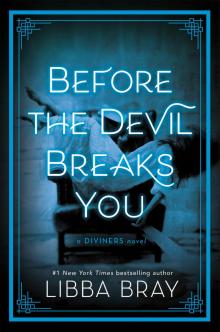 Before the Devil Breaks You
Before the Devil Breaks You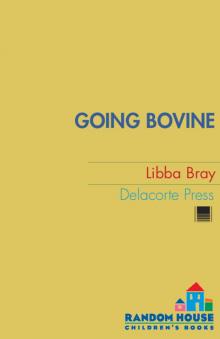 Going Bovine
Going Bovine A Great and Terrible Beauty
A Great and Terrible Beauty Rebel Angels
Rebel Angels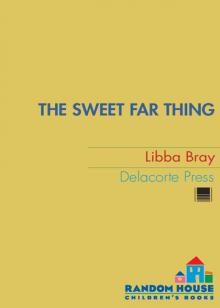 The Sweet Far Thing
The Sweet Far Thing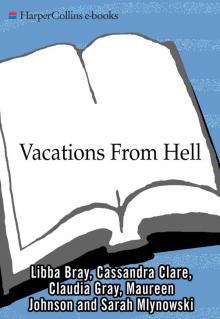 Vacations From Hell
Vacations From Hell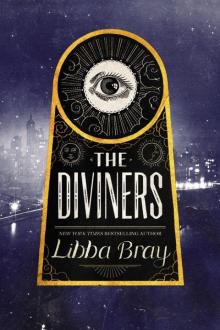 The Diviners
The Diviners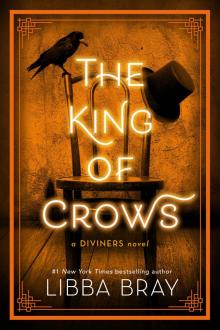 The King of Crows
The King of Crows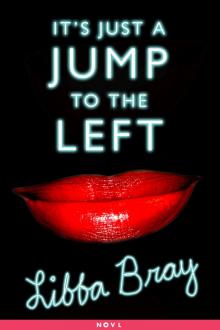 It's Just a Jump to the Left
It's Just a Jump to the Left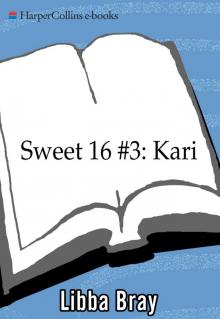 Kari
Kari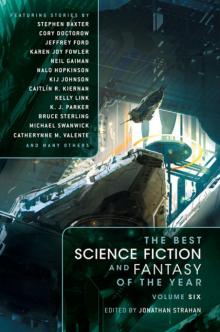 The Best Science Fiction and Fantasy of the Year Volume 6
The Best Science Fiction and Fantasy of the Year Volume 6